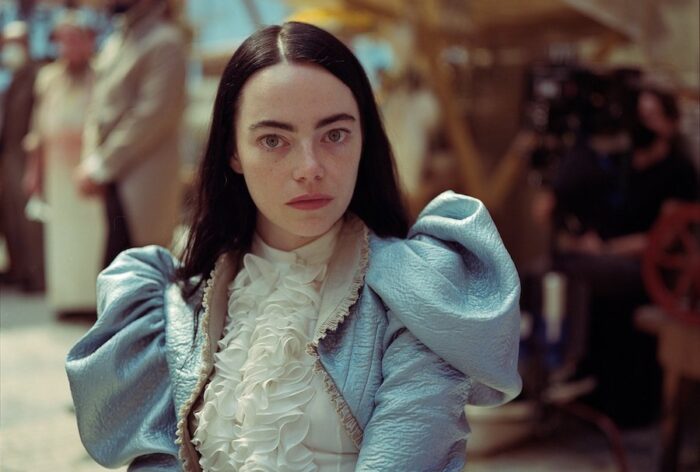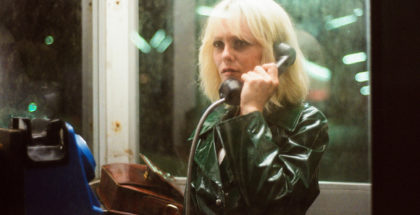Poor Things: An odd, entertaining delight
Review Overview
Cast
8Visuals
8Astonishment
8Ivan Radford | On 13, Mar 2024
Director: Yorgos Lanthimos
Cast: Emma Stone, Mark Ruffalo, Willem Dafoe, Ramy Youssef
Certificate: 18
“I have adventured it and found nothing but sugar and violence. It is most charming.” Those are the words of Bella Baxter (Emma Stone) after she has begun travelling the world on a voyage of discovery. Bella is not your average young woman: she is the product of a ghastly experiment by Dr Godwin Baxter (Willem Dafoe), a Frankenstein-esque figure who takes the brain of a baby and inserts it into the body of a grown adult. The result is a coming-of-age tale unlike anything you’ve seen before.
Even once you’ve gotten past the premise, that’s immediately clear from the fantastical version of the Victorian age that Yorgos Lanthimos has assembled. Godwin – or “God”, as Bella calls him – lives in a warped, monochrome home that could have been built from bits of The Cabinet of Dr Caligari, filled with dogs that have chicken heads, bizarre contraptions and massive, voluminous bubbles that he burps loudly from his disfigured gastro-tubes.
Godwin hires Max (an endearingly earnest Ramy Youssef), a medical student, to monitor Bella and keep a record of her development and behaviour. Max falls in love with her eccentric, chaotic personality and Godwin hopes they will marry. Things go awry, however, when Bella runs off with another man: the dastardly (and brilliantly named) Duncan Wedderburn. Wedderburn, a lawyer intrigued by Bella’s unusual upbringing, is as seductive as he is roguish, and is determined to make Bella his. He soon learns that he is in for more than he expected.
The pair journey to Lisbon, Alexandria and Paris, and the film follows the broadening of her horizons by expanding its own palette. Fish eye lenses give way to a dizzying array of visuals, while colours move from stark black-and-white to over-saturated hues. All the while, Jerskin Fendrix’s evocative, inventive score evolves a recurring, unconventional motif into something more rich and complex.
Bella, meanwhile, experiences this expanding world as a parade of oddity, one full of conventions that she doesn’t know or understand. The more she learns, the more she bluntly calls out the sexist and cruel structures that govern society, even as she is driven by her own desires for new experiences – most of which involve sex. Wedderburn is all too happy to conceive of her as a clueless object for intercourse, but when she demands things on her terms, he becomes vicious and controlling. “You wish me to marry me or kill me,” she challenges him. “Is that the proposal?”
The script, adapted by Tony McNamara from a novel by Alasdair Gray, navigates through its own ambitiously difficult maze with often contradictory but always compelling ideas. There’s an undeniably empowering quality to the way that Bella refuses to be a victim to the men who want power over her – the paternal Godwin wants to contain and protect her, the doting Max wants to put her on a pedestal and the insecure Wedderburn wants to possess her. But there’s also more than one moment when that journey – which includes time working in a brothel – is uncomfortably voyeuristic and dubious in its presentation of independence and desirable female qualities. And yet the film, which is produced by Stone, is also bold in its exploration of female sexuality outside of the social prejudices and pressures that shape our everyday – there’s a lack of shame inhibiting Bella’s journey of self-discovery that is quite something to witness.
The cast are uniformly fantastic, from Willem Dafoe’s gentle yet undoubtedly depraved surgeon to Mark Ruffalo’s hilarious performance as Duncan, pivoting from purring to pathetic with the slightest shift in his gloriously unctuous accent. One central dance sequence is a masterful example of two performers organically bouncing off each other with chemistry and wit.
But it’s Stone who is the irrefutable star attraction, and she’s remarkable in a role that is simultaneously guileless and forthright. Her physicality is astonishing, as she throws herself into walking, looking and more with a gradually advancing understanding of her limbs and muscles. Her openness, meanwhile, allows Bella to be seen in a number of different ways that brings added layers to an already meaty lasagne of weirdness. However you interpret or see yourself in Bella’s odyssey, the story of someone learning through fresh eyes the ways of the world – and the ways of herself – without fear of not being accepted is inspiring. Poor Things’ achievement is immersing us so fully in her experience. It is an adventure full of sugar and violence. It is most charming.
















